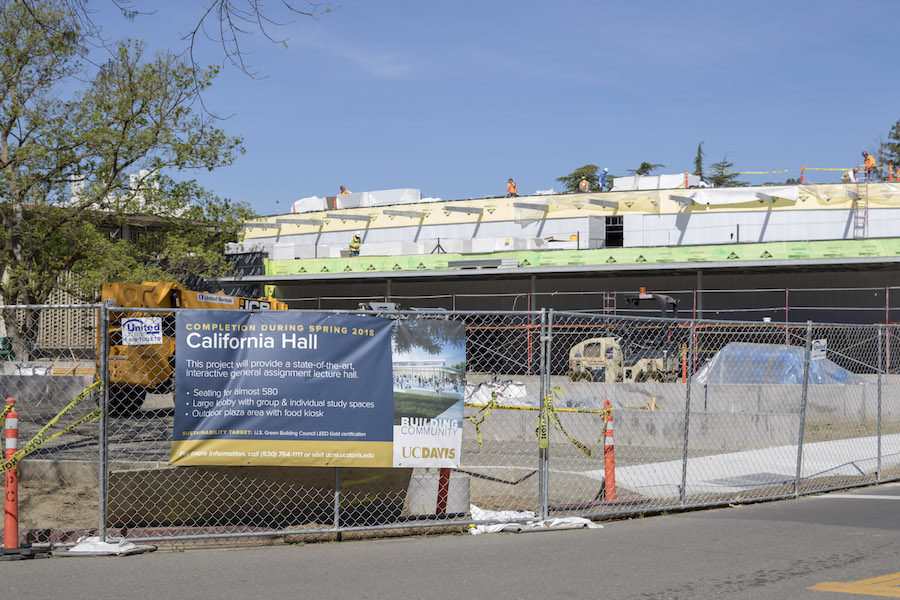
Performing groups struggle to find practice space amid inconvenient construction
Construction on the ARC began in mid-2017 and will continue through 2019. Avid users of the ARC can testify that construction has been an inconvenience to students; it limits the space of the gym, condensing the weight room on the basketball courts and limiting aspects of the ARC such as volleyball courts, racquetball courts and dance rooms.
Allie Young, a fourth-year clinical nutrition major, is a choreographer and captain of MK Modern, a dance group on campus. Young noted her frustration with the construction on campus and the implications it has in scheduling and planning practices for her dance group.
“One of the things that makes it really difficult [to practice in a studio] is that the ARC closes earlier now and the Pavilion side is closed by 11:30,” Young said.
MK Modern previously practiced in the Pavilion, utilizing the open space and mirrors better structured for dance teams. With the construction making the Pavilion an inconvenient option for dance groups, these organizations are forced to be creative in finding new space to practice. For MK Modern, the Hutchison parking garage makes an adequate practice space.
“Since our practices usually go from 10 p.m. to 1 a.m. and sometimes later, it’s really difficult to start practice in the Pavilion and move outside,” Young said. “Now we kind of just do the whole practice outside, which is why we practice in the parking structure.”
But Young noted that while the parking structure is an option for the dance group to practice at, it isn’t a space intended for performers, which is clear during practices. She notes specifically that the lack of mirrors makes it difficult for MK Modern to learn new routines and reflect on their dances.
“It makes it really hard for us to learn pieces and get an idea of where we really are just because there are no mirrors to watch ourselves and check ourselves,” Young said. “Now it’s really a reliance on the choreographer or the director who are watching the piece to help clean up the choreography.”
Performing groups come to the general consensus that the school doesn’t provide enough support or respect to performance groups, especially highlighted during the construction of the ARC.
“It feels like the school doesn’t really care or respect its registered student organizations, even though we all put a lot of time and effort into our sets in order to perform and compete outside of Davis, representing UC Davis,” Young said. “The Pavilion closes earlier, which means a lot of dance teams are forced to practice outside. The problem is that when we do practice in the parking structure, the police will often come by and kick us out. So in the end, it feels like we can’t practice anywhere on campus.”
Annie Altura, a fourth-year food science major, is a member of the Cleftomaniacs, an acapella group on campus. She notes that the hunt to book rooms may be somewhat easier for her group than for other performance art groups like MK Modern, as they aren’t as limited in their search for a practice space of a specific size. However, Altura admits that the UC Davis administration does give them challenges in booking these practice spaces.
“It is a little challenging, I don’t think we’ve ever gotten helped with regard to booking rooms,” Altura said. “We’ve been trying to book rooms for auditions, and there’s usually a cap of four hours a week, and a raise in price from $10 to $32 per reservation. We would have to request extra hours in order to book more rooms. It’s tricky to find rooms with good sound because that’s not exactly something administration would know.”
These performing organizations attempt to find creative solutions in order to continue their practices and prepare for upcoming competitions and showcases, but emphasize the difficulty in doing so due to the school administration. Hau-Ping Ting, a third-year biochemical engineering major, recalls difficult experiences finding practice spaces for her dance group due to interference from school representatives.
“We got kicked out [during practice] a few times, especially now that the ARC is under construction,” Ting said. “We tried to practice at the racquetball court once but they made us leave. They told us that it was intended for other sports, even though we reserved the court and there wasn’t any other space we could use to practice.”
Additionally, amid the large expansion and construction of the ARC, there was little to no renovation planned to foster growth or support for the performing arts.
“If you see the ARC under construction there’s nothing that really gears towards dance,” Ting said. “The dance studio on the second floor is still open, and it’s just really old. Renovation and expansion is probably needed, but it’s not happening right now.”
Members of these organizations advocate for change and note solutions that UC Davis’ administration can adopt in order to better respect the time and efforts of the performing arts groups on campus.
“I would suggest allowing us to reserve practice spaces more often, more than just two days for two hours,” Young said. “[They could also] allow us to reserve more practice spaces — so not just the Pavilion or dance studio, but also Freeborn Hall or the dance studio in Hickey Gym.”
Written by: Alyssa Hada — features@theaggie.org



